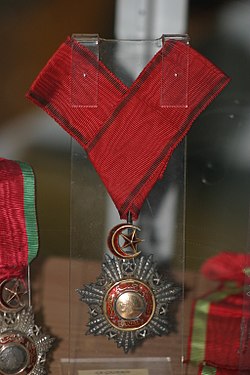Medjidie
| Order of the Medjidie | |
|---|---|

Arms of the Order of the Medjidie
|
|
| Awarded by Ottoman Sultan |
|
| Country | Ottoman Empire |
| Type | Order |
| Eligibility | Civilians and military |
| Awarded for | Outstanding services to the state by Foreign nationals |
| Status | No longer awarded |
| Statistics | |
| Established | 1851 |
| First awarded | 1851 |
| Last awarded | 1917 |
|
Ribbon bar of the medal |
|
Medjidie or Mejidie (Turkish: Mecidiye Nişanı, August 29, 1852 – 1922) is the name of a military and knightly order of the Ottoman Empire. The Order was instituted in 1851 by Sultan Abdülmecid I.
Instituted in 1851, the Order was awarded in five classes, with the First Class being the highest. The Order was issued in considerable numbers by Sultan Abdülmecid as a reward for distinguished service to members of the British Army and the Royal Navy and the French Army who came to the aid of the Ottoman Empire during the Crimean War against Russia. In Britain it was worn after any British gallantry and campaign medals awarded, but before the Turkish Crimean War medal. The Order was usually conferred on officers but a few enlisted soldiers also received it in a lower class. During World War I it was also awarded to a number of German, Austrian and Bulgarian officers.
The Order was often conferred on non-Turkish nationals.
On the obverse of the star is Sultan Abdülmecid's royal cipher surrounded by an inscription on a gold-bordered circle of red enamel; all on a star of seven triple quills with small crescents and five-pointed stars between them, suspended from a red enameled crescent and star suspender with green enameled edges.
Rough translation of the front: To the left: (you have) crossed. To the right: (you are proven to be) correct. At the top: (you have provided) protection. At the bottom: Year 1268. In the centre: In the name of the God the forgiver, the merciful.
The order has 5 classes. First, second, third and fourth classes are gold. Fifth (lower) class is silver.
Owners of the order:
![]() This article incorporates text from a publication now in the public domain: Chisholm, Hugh, ed. (1911). "". Encyclopædia Britannica (11th ed.). Cambridge University Press.
This article incorporates text from a publication now in the public domain: Chisholm, Hugh, ed. (1911). "". Encyclopædia Britannica (11th ed.). Cambridge University Press.
...
Wikipedia
